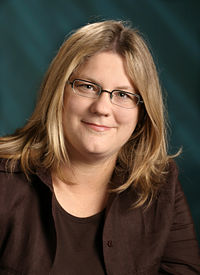Margreth Keiler
From Santa Fe Institute Events Wiki

Hi, my name is Margreth and I am a post-doc at the Department of Geography and Regional Research of the University Vienna, Austria.
My research interests and activities include both, process-oriented and applied research on natural hazards and risk. One special focus is on the spatial and temporal evolution of risk and I conducted studies on the variability of natural hazard processes as well as of values at risk.
I believe that one of the fundamental reasons for the lack of progress regarding natural hazard risk is the continuing separation of the research on natural processes and social processes without considering interaction between these systems. Therefore, an objective is to develop more balanced analyses of risks associated with the interaction of socio-economic and geophysical processes.
My current research places emphasis to develop a conceptual model for coupled human-landscape systems in alpine regions to achieve more insights in the two-way interaction between landscape and human systems. In this context the implications of complexity theory are a promising tool for this integrative research.
I am looking forward to meeting you soon and I hope we will have a lot of interesting discussion on complex systems.
Please feel free to contact me at margreth.keiler@univie.ac.at.
1. What are your main interests? Feel free to include a "pie in the sky" big idea!
I am interested in complex systems with respect to geomorphology and landscape evolution and especially on emergent properties in such systems. I have a background in natural hazard and risk research and therefore a further focus is also on the interaction of the geomorphic/landscape systems and the socio-economic systems. How can these interactions be integrated in nonlinear dynamic models to learn more about self-organisation and emergence of coupled systems? Is complexity theory a possibility to better answer interdisciplinary questions without switching between different perspectives? Which influence appears when different spatial and temporal scales are considered? How can these aspects be mirrored in models?
2. What sorts of expertise can you bring to the group?
Trained as a geographer I have a broad knowledge on natural and social sciences’ aspects, above all with a focus on temporal and spatial aspects. I am sure to have some idea on different interpretation of complexity in these disciplines. The interpretation within geomorphology has at least two diverse ways. As relative novice in complex systems’ theory (with no more than two years’ experience from a theoretical point of view) I believe I do not yet have such a profound knowledge in different methods. I can contribute with in-depth knowledge on GIS (Geographical Information Systems) and landscape systems, environmental change as well as the modelling and assessment of risk induced by natural hazards.
3. What do you hope to get out of the CSSS?
I hope to learn a lot about the different methods used for studying complex systems from various disciplinary points of view. I am looking forward discussing (embedded in the obviously multi-disciplinary atmosphere at CSSS) the different perspectives and get some new ideas that I can integrate with some colleges of CSSS in my future studies.
4. Do you have any possible projects in mind for the CSSS?
I would suggest working on a conceptual model for a two-way coupled human-landscape-system. To illustrate this idea a little bit:
Many examples can be given for natural hazards highlighting the interactions between human and landscape systems such as the use of areas prone to floods for settlement purposes, leading to the regulation of rivers by levees, which in turn encourages – as a result of further development – increased values in areas behind these levees. The levees are adapted to the current environmental conditions, but might not feature future conditions of changing magnitude and frequency of floods due to climate change processes.
My idea might be too large for the short time during the stay at CSSS, hence it will be a starting point for discussion and further development.
